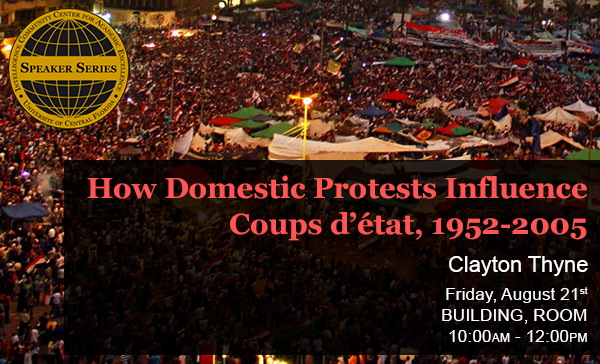
- This event has passed.
How Domestic Protests Influence Coups d’état, 1952-2005
August 21, 2015 @ 10:00 am - 11:30 am

Join us as Dr. Clayton Thyne presents his research on How Domestic Protests Influence Coups d’état.
The paper considers how domestic protests influence coups. Protests signal regime illegitimacy, which incentivizes coups and provides a favorable post-coup climate for reforms. Protests also ease coordination obstacles among coup plotters, and make international actors less likely to punish coup leaders. Johnson and Thyne expect these processes to be strongest when protests take place near the capital, are non-violent, and challenge semi-authoritarian regimes. Their empirical analyses introduce event-level protest data from the SPEED project into the coup literature. Examining a global sample of coup attempts from 1952 to 2005, they find strong support for our theoretical expectations. Their discussion provides implications for scholars studying coups and non-violent movements more generally. It also speaks to the influence of external actors on social uprisings, and highlights the importance of geographical disaggregation in the study of dissident behavior.
Clayton Thyne is an Associate Professor in the Political Science department at the University of Kentucky. He serves as the Director of Graduate Studies and the Director of the Peace Studies program at UK . His research currently focuses on domestic conflict/instability, coups d’état, regime types and democratization, and international education policy.
All students and faculty are welcome to attend.